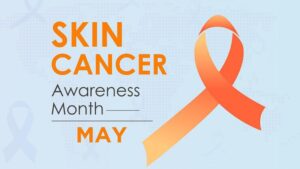Introduction:
Skin Cancer Awareness Month is a crucial annual event that aims to educate and empower individuals about the risks, prevention, early detection, and treatment of skin cancer. As dermatology patients, it is essential to prioritize our skin health and understand the significance of this month-long campaign. In this blog post, we will delve into the importance of skin cancer awareness, highlighting key information, tips, and resources that can assist you in safeguarding your skin and overall well-being.
Understanding Skin Cancer:
Skin cancer is the most common form of cancer worldwide, but the good news is that it is largely preventable and highly treatable when detected early. There are three main types of skin cancer: basal cell carcinoma (BCC), squamous cell carcinoma (SCC), and melanoma. While BCC and SCC are more prevalent and tend to be less aggressive, melanoma is the most dangerous form and can metastasize to other parts of the body if not addressed promptly.
Prevention Strategies:
Prevention is undoubtedly the best defense against skin cancer. Adopting simple yet effective strategies can significantly reduce the risk of developing this disease. Here are some fundamental prevention measures to keep in mind:
- Limit sun exposure: Seek shade during peak hours (10 a.m. to 4 p.m.) when the sun’s rays are strongest. Wear protective clothing, wide-brimmed hats, and UV-blocking sunglasses.
- Apply and reapply sunscreen: Use a broad-spectrum sunscreen with an SPF of 30 or higher on all exposed skin. Reapply every two hours, or more frequently if swimming or sweating.
- Avoid tanning beds and sunlamps: These artificial sources of UV radiation are harmful and can increase the risk of skin cancer.
- Perform regular self-examinations: Familiarize yourself with your skin’s normal appearance and conduct monthly self-examinations to spot any changes or suspicious moles or growths. Don’t forget to check hard-to-see areas like the scalp, back, and bottoms of the feet. If you notice any concerning changes, consult your dermatologist promptly.
Seeking Professional Help:
Regular visits to a dermatologist play a vital role in skin cancer prevention and early detection. Dermatologists are trained to identify potential skin abnormalities and provide appropriate care. It is recommended to have a professional skin examination at least once a year, or more frequently if you have a history of skin cancer or other risk factors. These visits also provide an opportunity to discuss any concerns, seek guidance on sun protection, and receive valuable education tailored to your specific needs.
Educational Resources:
During Skin Cancer Awareness Month, numerous organizations and medical institutions conduct awareness campaigns, host events, and provide educational resources. Here are a few resources you can explore:
- Skin Cancer Foundation (www.skincancer.org): A trusted resource offering comprehensive information about skin cancer, prevention guidelines, and tools for self-examination.
- American Academy of Dermatology (www.aad.org): A reputable organization providing expert guidance, educational materials, and access to dermatologists in your area.
- National Cancer Institute (www.cancer.gov): The NCI website offers a wealth of information on skin cancer, clinical trials, and the latest research developments.
Conclusion
Skin Cancer Awareness Month serves as a powerful reminder for dermatology patients to prioritize skin health and take proactive measures to prevent skin cancer. By adopting preventive strategies, seeking professional help, and staying informed through valuable resources, we can safeguard our skin and overall well-being. Let us commit to spreading awareness and encouraging others to embrace sun-safe habits, ensuring a brighter, healthier future for everyone.
Remember, your skin is precious—protect it, examine it, and empower yourself with knowledge!

